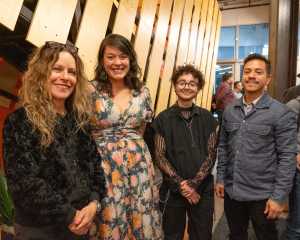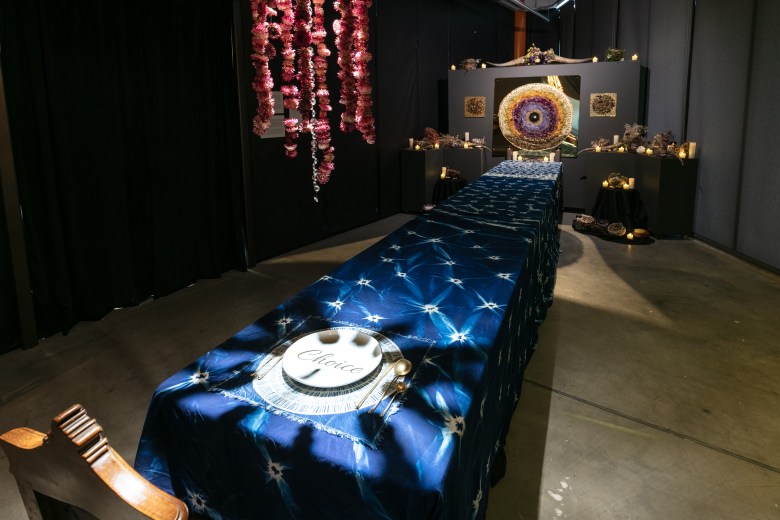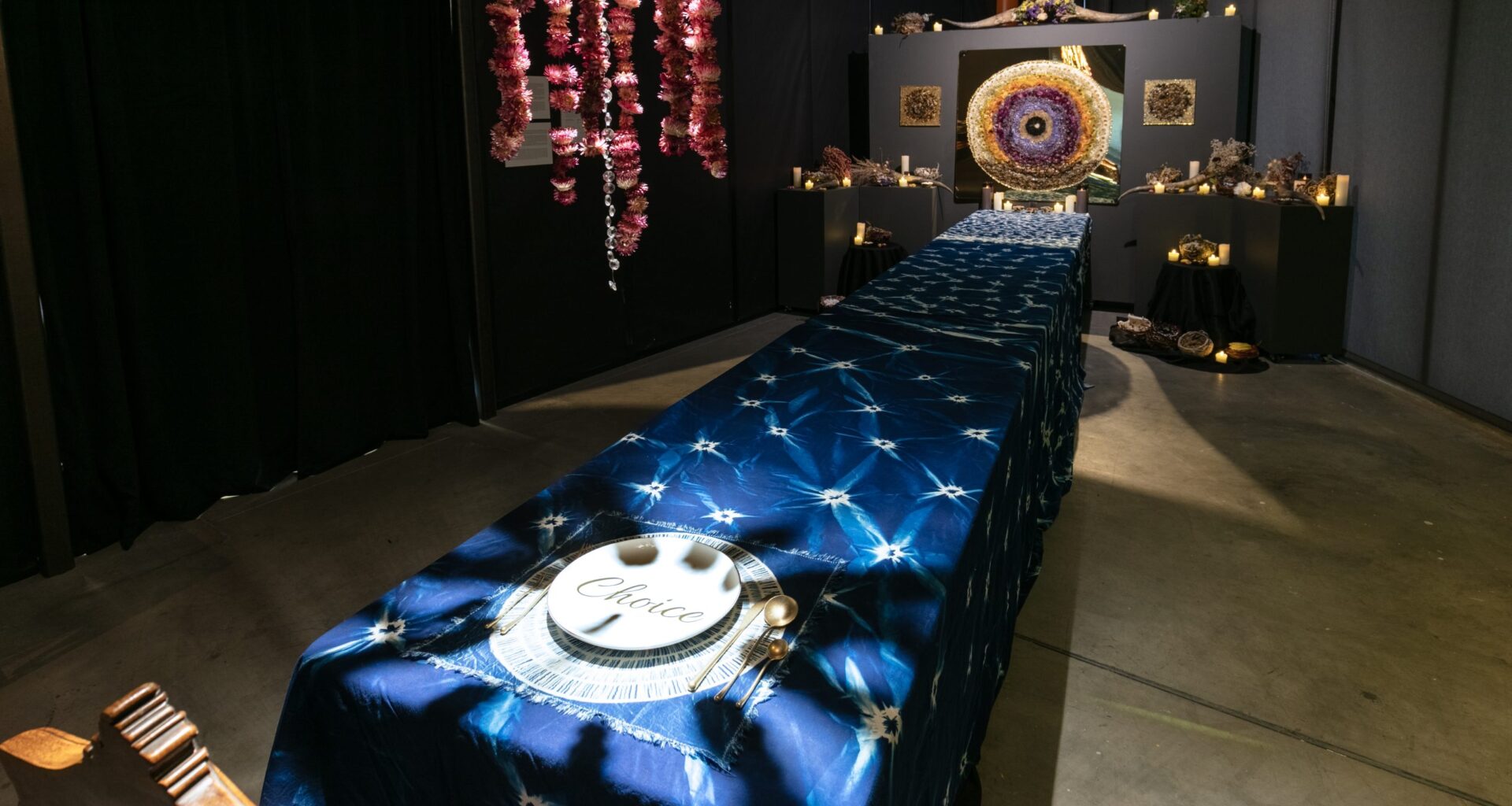A long, blue-clothed table extended across the dark room to an altar decorated with steer horns, flowers, candles and beans—at the other end sat a plate decorated with one word—“Choice.”
With this installation, Denver artist Eileen Roscina said she is “challenging the fallacy that humans are the most important entity on the planet and examining what nature can teach us about being human.”
 At a recent PlatteForum artists discussion, titled “Talking All Things Climate Change and Food,” participants, from left, Linda Appel Lipsius, Eileen Roscina, Jayden Lynx, and Roberto Meza spoke about their work and how it addresses societal issues. Photo courtesy of David Grajeda Gonzalez
At a recent PlatteForum artists discussion, titled “Talking All Things Climate Change and Food,” participants, from left, Linda Appel Lipsius, Eileen Roscina, Jayden Lynx, and Roberto Meza spoke about their work and how it addresses societal issues. Photo courtesy of David Grajeda GonzalezThe evocative table-and-altar installation was just one piece at “On the Table,” a multimedia exhibition on display at A.I.R. Annex Gallery. The exhibition, which runs through early December, was part of Roscina’s artist residency at PlatteForum, a local nonprofit organization that connects youth and artists with resources while addressing social issues.
The artist residency is a competitive six- to eight-week program that gives artists the “time, space, and support they need to create a new body of work which inspires and connects communities,” according to the PlatteForum website.
Roscina’s exhibit encouraged reflection on how individual choices affect the planet.
“When we interface with climate change, it’s easy to feel powerless, paralyzed, and passive—because the issue is so massive, and often abstract. This notion led me to investigate: how can I make the most impactful difference as an individual?” she asked in a statement about the exhibit.
An artist might seem an unlikely activist for raising awareness for climate change, but according to Manda Gorsegner, division head of visual and performing arts at the Arts Institute of Middlesex County, their work is essential.
“The contemporary climate change movement requires the integration of artists to respond to the challenges of climate change not merely as buffers between the public and the hard data but to incite a richer and more complex conversation,” Gorsegner wrote in her thesis.
It was in the vein of initiating complicated conversation that made Roscina’s project appealing to the program.
 This art exhibit by Eileen Roscina is an example of the various work presented at PlatteForum 2700 Arapahoe St, Suite 102, in the Curtis Park neighborhood. Photo courtesy of Wes Magyar
This art exhibit by Eileen Roscina is an example of the various work presented at PlatteForum 2700 Arapahoe St, Suite 102, in the Curtis Park neighborhood. Photo courtesy of Wes Magyar
“We selected Eileen Roscina as one of our artists in residence not only for her beautiful work, but we also thought she was bringing forth important topics in her work, such as climate change and the future of food, which we thought was important for our community to learn about,” PlatteForum curator Ilan Gutin said.
Over the course of her residency, Roscina worked with PlatteForum’s ArtLab interns—paid arts interns from Denver metro-area high schools—to create additional pieces for the exhibition.
Over seven weeks, the group gathered natural materials, filmed, created nests from found objects and exposed cyanotype flags. Their work was also on display at the exhibit.
Alongside Roscina, the ArtLab interns thought of alternative ecological futures and engaged in projects to assist climate action.
According to ArtLab intern Ziah Martinez, working with Roscina helped him widen his perspective as an artist.
“The program helped me understand what we as humans consume and how much waste we create. Roscina taught us how to use waste as art or food,” he said. “I learned that it helps make a tiny change and that all of these tiny changes can impact something so big.”
The ArtLab interns also conceptualized the questions asked at an artist conversation in November titled “Talking All Things Climate Change and Food.” The panel featured Roscina alongside Roberto Meza, co-founder of Emerald Gardens and East Denver Food Hub, and Linda Appel Lipsius, executive director of Denver Urban Gardens.
The conversation was moderated by former ArtLab intern Jayden Lynx and addressed topics such as the future of food, connection to and disconnection from our food system, and how individuals can make an impact.
In the talk, Roscina said she hoped to get people talking about these “complex and uncomfortable topics.” A self-described “conflicted carnivore” and lover of the natural world, she knows firsthand how challenging these conversations can feel.
This artist conversation was the first in a series meant to “allow youth to interview resident artists along with activists and experts who will bring cross-sector topics to the forefront such as environmentalism, racial equity, and mental health,” hosted by PlatteForum.
Learn more about Roscina at eileenroscina.com. More information about PlatteForum at A.I.R. Annex Gallery, 3575 Ringsby Ct. Unit 103, can be found at platteforum.org.
Related
